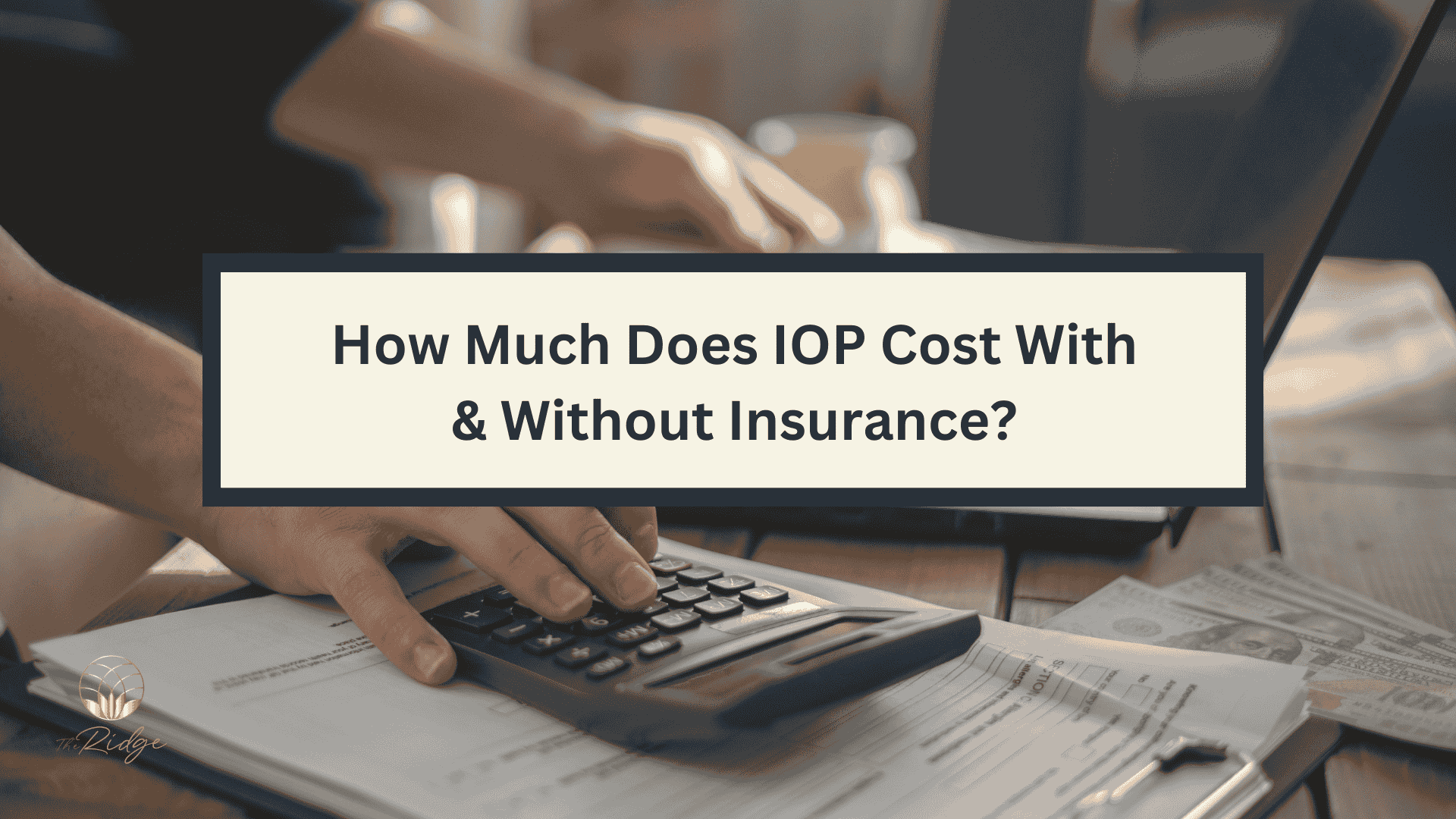- Home
- Blog
- Addiction Treatment
- How Much Does IOP Cost With and Without Insurance?
How Much Does IOP Cost With and Without Insurance?

- Home
- Blog
- Addiction Treatment
- How Much Does IOP Cost With and Without Insurance?

Table of Contents
Intensive Outpatient Programs (IOP) provide structured treatment for individuals experiencing addiction, mental health challenges, or substance use disorders. These programs are effective and flexible and allow you to balance recovery with daily responsibilities.
With insurance, costs vary depending on factors like copays, deductibles, and your specific plan. Without insurance, the expenses can be significant, and we at The Ridge Ohio, don’t want you to have financial troubles. This article reviews how much IOP costs with and without health insurance so you can make the right decision for your health.
IOP Cost With Insurance
There are five important factors regarding the costs of intensive outpatient programs (IOP), from the number of visits to the coverage limits. Here are the factors:
- Copays: Fixed charges for each session or visit.
- Deductibles: Amount you must pay before insurance starts covering costs.
- Insurance Plan Type: Coverage varies for HMO, PPO, or EPO plans.
- In-Network vs. Out-of-Network Providers: In-network options often reduce charges.
- Coverage Limits: Some plans cap the number of sessions they will cover.
Insurance coverage for IOP varies depending on your needs. Usual plans cover 50% to 80% of the total charges, depending on your eligibility and plan type. For example, one plan may charge a $20 copay per session, while another requires meeting a $1,000 deductible before full coverage applies. Understanding your plan helps you manage finances and access the care you need.
IOP Cost Without Insurance
The cost of IOPs without insurance can range from $2,000 to $10,000 for a full program. Facilities like The Ridge Ohio calculate charges based on factors such as program duration, treatment needs, and therapy frequency.
Longer programs with specialized services, such as individual counseling or medication management, often result in higher costs.
When you estimate your expenses, consider additional charges for group therapy, medical consultations, or mental health support. These factors add up quickly, making it important to plan your finances carefully.
Many treatment centers offer payment plans or sliding scale options to make care more affordable. Seeking help is important, and understanding the costs can help you take that next step.
Common Types of Intensive Outpatient Program (IOP)
Intensive Outpatient Programs will help you address various issues and offer tailored treatment for specific challenges. Specialized programs often focus on addiction recovery, mental health treatment, or co-occurring disorders.
And you don’t have to worry about choosing the right treatment, as providers will do that for you! You will be assessed by professionals and directed to the right path.
For substance use disorders, IOPs provide therapy and support to help overcome dependency. To us, it matters how you feel, and we want to help you. We use proven methods to help you understand why you feel how you feel.
Some programs combine treatments to handle both addiction and mental health needs. The flexibility of IOPs allows you to balance treatment with daily responsibilities. These programs include individual counseling, group therapy, and skill-building sessions to support long-term success.
IOP for Alcohol Use Disorder (AUD)
Intensive Outpatient Programs for Alcohol Use Disorder (AUD) often lead to positive outcomes. Our patients report reduced alcohol use and improved mental health. Success rates improve when therapy, education, and family involvement are combined.
The flexibility of IOP allows you or your loved one to stay committed to recovery while managing daily responsibilities. These programs offer a strong foundation for lasting sobriety. Just check whether you qualify for the program! There are different methods when it comes to treating AUDs:
- Individual Therapy: One-on-one counseling to explore triggers and develop coping strategies.
- Group Therapy: Sessions to share experiences and build peer support.
- Family Counseling: Involvement of loved ones to strengthen support systems.
- Education Sessions: Learning about alcohol use disorder and recovery techniques.
- Session Frequency: Three to five times per week, depending on individual needs.
IOP for Substance Use Disorder (SUD)
Substance Use Disorder (SUD) presents unique challenges, such as cravings, withdrawals, and triggers, especially in IOP settings. However, with the right support system and treatment plan, IOP can help significantly. To address those challenges, we use targeted strategies to help you recover. Therapists determine your specific needs and create a personalized plan.
These plans typically include individual counseling to explore underlying issues, group therapy to build peer support, and skill-building sessions to manage stress.
Education on substance use and its effects helps you understand your condition and stay motivated. Programs may also include medication-assisted treatment when necessary.
With regular sessions and ongoing support, IOP provides the tools to overcome SUD while maintaining daily responsibilities. These strategies guide you toward a healthier, substance-free life.
IOP for Mental Health Treatment
Intensive Outpatient Programs (IOPs) for mental health treatment address conditions like anxiety, depression, and mood disorders. These programs provide flexible support while allowing you to maintain daily responsibilities.
Therapists assess your unique needs and design a plan that includes structured therapy and skill-building sessions. IOPs focus on managing symptoms, reducing stress, and improving overall well-being.
We will create a safe space to explore emotions and develop healthier coping strategies. Regular sessions encourage progress and build resilience for long-term success. Here are the therapeutic approaches we use:
- Cognitive Behavioral Therapy (CBT): Identifying and changing negative thought patterns.
- Dialectical Behavior Therapy (DBT): Teaching mindfulness and emotional regulation.
- Group Therapy: Sharing experiences and building peer support.
- Family Counseling: Strengthening support systems.
Factors That Affect IOP Costs
The cost of Intensive Outpatient Programs (IOPs) can vary based on several factors. The program’s location plays a significant role, as areas with higher living expenses often charge more. The duration and frequency of sessions also affect the total cost, with longer programs typically requiring a higher financial commitment.
The type of treatments offered, such as specialized therapies or medication-assisted treatment, can increase expenses. Insurance coverage also impacts costs significantly, as copays, deductibles, and out-of-network fees add to the total.
Duration and Frequency of Treatment
The duration and frequency of treatment directly impact the total cost of an IOP. Longer programs with frequent sessions often cost more, but those will be very helpful in the long run.
Shorter programs with fewer sessions may reduce expenses but might not offer enough time for complete treatment. So, you would want to find a balance between costs and your needs Here’s how these factors influence costs:
- Session Length: Longer sessions typically involve higher fees.
- Program Duration: Programs lasting several months increase the overall expense.
- Frequency of Sessions: Attending three to five sessions weekly raises costs compared to less frequent options.
- Treatment Intensity: Higher frequency programs focus on intensive care, which often leads to increased charges.
Balancing these factors helps you choose the right program for your needs and budget.
Insurance Coverage and Plan Type
Different insurance plans, like HMO, PPO, and EPO, significantly affect the cost coverage of Intensive Outpatient Programs (IOP).
HMOs typically require you to use in-network providers, reducing costs but limiting flexibility. PPOs offer more provider options, including out-of-network care, but often include higher premiums and deductibles. EPOs combine aspects of both, requiring in-network care while providing some flexibility.
The type of plan also determines your copays, deductibles, and coverage percentages. For example, a PPO might cover 70% of the program cost, leaving you responsible for the rest. You want to pay attention to the costs so you don’t have to worry about them in the long run.
Location and Specific Program Features
Where you are located plays a major role in determining IOP costs. Areas with higher living expenses, such as urban centers, Los Angeles, or New York, often charge more for treatment due to increased operational costs. In contrast, rural locations may offer lower rates.
Regional demand for mental health and addiction treatment also impacts pricing. High-demand areas with limited facilities may result in higher fees.
Additionally, local economic factors, such as wages and real estate costs, directly influence program expenses.
Specific program features, like access to advanced therapies or highly trained specialists, can further increase costs.
Key Takeaways
Intensive Outpatient Programs (IOPs) provide effective treatment options for addiction and mental health challenges. Costs vary based on factors like location, program duration, session frequency, and insurance coverage. With insurance, you may face copays, deductibles, and coverage limits depending on your plan type.
Without insurance, your costs can range from $3,000 to $10,000, influenced by the program’s features and length. Choosing in-network providers and exploring payment plans can help reduce expenses. Take the time to evaluate your options, plan your finances, and focus on your path to recovery.
Frequently Asked Questions
Does insurance cover the full cost of IOP?
No, insurance typically does not cover the full cost of Intensive Outpatient Programs (IOP). Most plans require you to pay copays, meet deductibles, or cover a percentage of the total cost. For example, a PPO plan might cover 70% of the expenses, leaving you responsible for the remaining 30%.
Planning ahead ensures you can focus on recovery without unexpected financial stress.
How long is a typical IOP program?
A typical Intensive Outpatient Program (IOP) lasts 8 to 12 weeks. The exact duration depends on the type of disorder being treated and individual needs. For substance use disorders, programs often run three to five days per week, with sessions lasting two to four hours. Mental health-focused IOPs, such as those for anxiety or depression, may have shorter or less frequent sessions.
More severe cases might require extended care beyond the standard timeframe. Therapists assess your progress regularly and adjust the program as needed.
Are there payment plans for IOP without insurance?
Yes, clinics offer payment plans for Intensive Outpatient Programs (IOP) if you don’t have insurance. Contact us to learn more about the payment options to make treatment more accessible by breaking costs into manageable monthly payments. Some facilities also use sliding scale fees, adjusting the cost based on your income or financial situation.
Also, clinics may provide discounts for upfront payments or referrals to third-party financing options. Always ask the clinic about flexible payment arrangements and even coverage for early departure during your initial consultation.
What does IOP include in terms of treatment?
An Intensive Outpatient Program (IOP) includes several key components to support your recovery. Individual therapy sessions focus on identifying triggers and building coping strategies. Group therapy provides peer support and shared learning experiences.
Family counseling helps strengthen your relationships and creates a supportive environment for healing. With flexible scheduling, IOP allows you to receive effective care while managing your daily responsibilities. We are here to support you each step of the way, no matter how long it takes!





